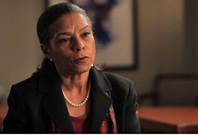 "Of all the forms of inequality, injustice in health care is the most shocking and inhumane.” These words were spoken in 1966 by Dr. Martin Luther King Jr. at the Convention of the Medical Committee for Human Rights. Risa Lavizzo-Mourey, CEO and President of the Robert Wood Johnson Foundation and a key player on the national stage, has spent much of her life answering the call to action implicit in those words.
"Of all the forms of inequality, injustice in health care is the most shocking and inhumane.” These words were spoken in 1966 by Dr. Martin Luther King Jr. at the Convention of the Medical Committee for Human Rights. Risa Lavizzo-Mourey, CEO and President of the Robert Wood Johnson Foundation and a key player on the national stage, has spent much of her life answering the call to action implicit in those words.Lavizzo-Mourey met Dr. King in her home when she was 7, and says of this visit, "I remember seeing him sitting in our living room and thinking, 'Here's someone who's really making a difference in the world.'" Lavizzo-Mourey has worked hard to make her own difference by improving health and health care for Americans, particularly for at-risk and underserved populations. Here are three strategies she uses to unlock success and create changes around complex and deeply rooted public health problems.
One: Make big bets and commit for the long haul.
The Robert Wood Johnson Foundation, with Lavizzo-Mourey at the helm, has a number of focus areas in the health and health care arenas, including improving end-of-life care, reducing adolescent smoking, and reversing childhood obesity. She says that to accomplish such goals she and her team develop a strategy, which often requires initiating policy change, and commit resources for as long as it takes to achieve a particular goal. "We look over the long haul, often 10, 20 years," she says. The campaign to reduce the rate of smoking in young people, for example, was far from a quick and easy victory. "It was about a 20-year battle to really make a difference in how parents, policymakers, [and] school officials saw issues like how much cigarettes cost, how easy it was for people to smoke in public environments and the need to educate on an ongoing basis about the [harmful effects] of tobacco," says Lavizzo-Mourey. She adds that the campaign resulted in successfully lowering the rates of young smokers for some time but that this issue is "ripe for reinvestment."
Martin Luther King inspires Risa Lavizzo-Mourey to take on the “injustice in health”
See a complete archive of Risa Lavizzo-Mourey's videos.
Two: Make collaboration a priority.
There may be few absolutes in philanthropy but there is at least this one: Making progress on complex issues requires a host of collaborators. Lavizzo-Mourey and the RWJF embrace this truth, especially around creating policy change. "Policy change is hard," she says. "It takes time and it takes collaboration across sectors, and sometimes it takes people who spend more time fighting amongst themselves to come together." She points to the 911 emergency system, which the Robert Wood Johnson Foundation was instrumental in creating. At the time, she says, far too many young people died of injuries, because there was no single number to call. "You had to call the ambulance, you had to call the police, you had to call the fire department—there was no two-way communication we know today." By working with disparate groups to participate in an evaluation, the foundation was able to study the effectiveness of the single number to call in an emergency. It now seems unthinkable that there was a time without 911, but the road to creating it was uphill and required many people joining together across their silos.Three: Measure your progress and adapt your strategy.
The 911 example speaks to the importance of research and measurement. Measurement is even more important to making progress on complex issues over the long haul—but that doesn't make it easy. "Learning from that measurement is something that you absolutely have to stay focused on in philanthropy, and it’s very hard to know in the short term if you’re really making a difference," says Lavizzo-Mourey. "We try to measure at all levels in order to really understand whether we’re making a difference and, most importantly, where we’re not, how we can do it better." For example, one unsuccessful intervention Lavizzo-Mourey and the Robert Wood Johnson Foundation studied prompted a re-examination of strategy, which then led to a new communications campaign. All this research and measurement—adaptive strategy—costs money, of course. The foundation spends about 10% of its investments on measurement, but this is a crucial investment, says Lavizzo-Mourey. "Philanthropy is one of the few places where you can invest, take risks, and fail and if you don’t learn from those failures, if you don’t put the money in to learn from those failures, society at large loses."Creating real improvement in society—democratizing change that will improve the health and health care access for all—is Lavizzo-Mourey's and the Robert Wood Johnson Foundation's mission, and that takes deep commitment, collaboration, and attuned measurement. They have taken to heart the words Dr. King once said, “Philanthropy is commendable, but it must not cause the philanthropist to overlook the circumstances of economic injustice that make philanthropy necessary."


